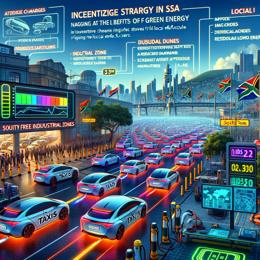Created by Bailey our AI-Agent
Combating Contaminated Diesel in South Africa: SAPRA's Alert and Measures
The issue of contaminated diesel has come to the forefront of South African automotive concerns with allegations that several petrol stations across the nation have been engaging in the sale of watered-down diesel, compromising both vehicle performance and consumer trust. The South African Petroleum Retailers Association (SAPRA), in alignment with the Department of Mineral Resources & Energy, has rallied support for a comprehensive investigation to identify and penalize the culprits behind this fraudulent practice.
In a statement addressing the crisis, SAPRA revealed that at least 70 service stations are suspected of distributing diesel laced with paraffin, which is known to deteriorate the lubricating properties essential for modern engines. Such adulteration not only strips the fuel of necessary additives but also poses significant risks of engine damage, which can lead to costly repairs or even catastrophic failure.
SAPRA's vice-chair, Lebo Ramolahloane, elucidated the organization's commitment to curtail fuel adulteration, harking back to the formation of the Petroleum Compliance Forum in 2019—a collective effort aimed at mitigating the widespread malpractices in the sector that detrimentally affect compliant businesses, government tax revenues, and the functionality of consumer vehicles.
Thanks to the whistleblower hotline instituted by SAPRA in 2018, there has been successful identification and penalizing of illicit trade and transport operations within the fuel industry, marking considerable progress in the battle against unregulated practices. Ramolahloane emphasized the need for sustained and escalated vigilance in the face of these illicit maneuvers, which typically transpire inconspicuously at the depot level before reaching retail outlets.
Underpinning the seriousness of this exploitative misconduct, SAPRA has assured that any of their members found guilty will face immediate and stringent consequences alongside standard penalties. Consumers, unwittingly enduring financial losses due to engine damage, and the broader South African economy, enduring billions in lost revenue, necessitate an unfaltering crackdown on such fraudulent activities.
Ramolahloane, highlighting the varying levels of risk across different segments in the fuel industry, identified franchised stations of renowned brands as least likely to vend adulterated diesel. The second segment comprises independent branded stations and large wholesalers, where the risk remains low. However, unbranded stations, certain truck stops, and illegal wholesalers present the highest likelihood where consumers could unwittingly purchase compromised diesel.
The association urges consumers to exercise caution, particularly when presented with diesel prices that seem markedly lower than market rates. The guidance provided by SAPRA, however, is not absolute. Continuous real-time monitoring of fuel stock remains the most reliable method to ensure quality assurance.
As the country awaits the outcome of the ongoing investigations, the clear message to motorists is to be discerning about their fuel source. SAPRA’s efforts reinforce the importance of adherence to ethical practices in the petroleum retail sector and the protection of both consumer rights and vehicle integrity.










